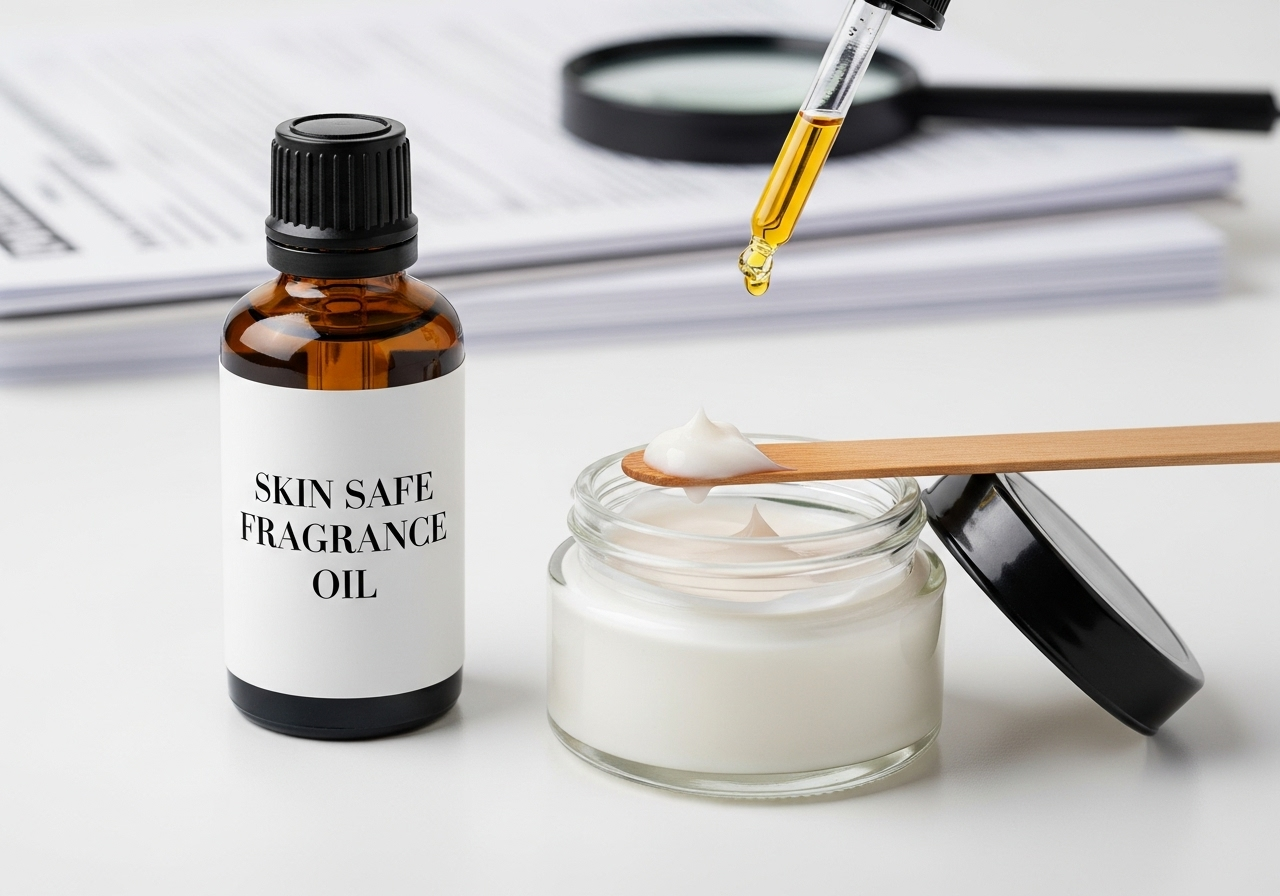
Many of us are in the habit of applying our favourite scent directly to the skin. But is it safe to do so? It was revealed in a study that 4.5% of the population has fragrance contact allergy in Europe. The prevalence is even higher in people who regularly use fragranced cosmetics.
So, the question is "are fragrance oils safe for skin?". In the cosmetics and perfumery world, this query is far from rhetorical. It also involves aspects like formulation, regulation and consumer safety.
To ensure "skin safe fragrance oils," the industry leans heavily on IFRA (International Fragrance Association) standards and professional safety guidelines.
In the article, we will look into what these standards are and how they help protect consumers.
Fragrance oils are complex blends of natural and synthetic aromatic compounds which are designed to mimic specific scents. They are also known as perfume oils or aromatic oils. Essential oils gets extracted from plants through steam distillation or the cold pressing process. On the other hand, fragrance oils are created in laboratories to achieve consistent, long-lasting aromas that might not even exist in nature.
The composition of fragrance oils typically contains:
The formulation helps fragrance oils to be used in various products, from perfumes and body lotions to soaps and candles.
Considering that fragrance oil has several chemical compounds, some of which can cause allergic reactions. That is why regulations are in place for safe use.
Certain fragrance ingredients are known to trigger adverse skin reactions, for example:
Studies suggest positive patch-test reactions to fragrance mixes can manifest as eczema or atopic dermatitis around areas of contact (wrists, neck, face).
Hence, using "skin-safe fragrance oils" is no longer a marketing gimmick; they are necessary.
IFRA, or the International Fragrance Association, is the global industry association representing fragrance manufacturers. It was founded in 1972 and aims to develop a self-regulatory framework to ensure the safe use of fragrance materials.
In collaboration with RFM (Research Institute for Fragrance Materials), IFRA conducts safety and toxicology evaluations. Then it issues Standards that restrict, ban, or specify allowable concentrations for fragrance ingredients.
Estimates suggest that IFRA member companies produce around 80% of the global fragrance volume, making IFRA compliance broadly influential.
The three types of primary IFRA standards include:
1. Prohibition: Certain ingredients are banned outright.
2. Restriction: Use is limited to a maximum concentration, depending on product type.
3. Specification: Specifying purity, isomeric form, or control of certain impurities.
If you often wonder, "Are fragrance oils safe for skin?" It is important to know that IFRA has defined safe use of fragrance oils. FRA sets the global benchmark for ensuring that skin-safe fragrance oils are used responsibly, protecting consumers without stifling creativity in perfumery.
Let us look at how IFRA defines safe use of fragrance oils:
Note: IFRA does not replace a full safety assessment; it only confirms that a particular fragrance meets the standard limits.
Whether you are a formulator or a skincare brand, here are the best practices for the professionals for creating skin safe fragrance oils:
Although IFRA has a guideline in place for skin-safe fragrance oils, formulators and product safety professionals often follow additional guidelines:
Here are some quite common misconceptions:
Even IFRA-compliant formulations can cause reactions in extremely sensitive individuals. The aim is to minimise risk, not eliminate it.
Many essential oils or "natural fragrance oils" contain potent allergens or phototoxins (e.g. bergamot, cinnamon leaf). Natural origin doesn't guarantee "skin safe fragrance oils."
The skin of the face is often more sensitive. Face products typically have stricter constraints than body lotions.
Dilution can minimise the effects, but it does not guarantee zero reactions.
So the answer to the question, "can fragrance oils be used on skin?" is yes, when they are formulated and used according to IFRA-approved limits. Safety isn't about avoiding fragrance; it's about using it responsibly. IFRA standards ensure that every drop of scent respects your skin's tolerance while delivering the luxury of aroma.
No. Pure fragrance oils are highly concentrated and must not be applied to the skin directly. They must be diluted in a carrier oil, lotion, or base product according to IFRA's approved use levels to be considered skin-safe fragrance oils.
Not necessarily. Only oils that are tested, reviewed, and certified according to IFRA's most recent amendment are compliant. Always ask your supplier for the latest IFRA Certificate before using a fragrance oil in skin care formulations.
No. Fragrance oils formulated for candles or diffusers are not skin-safe. They often contain ingredients meant for high-temperature diffusion, not dermal application. Always choose cosmetic-grade or skin-safe fragrance oils for body use.
It's a formal document from the fragrance supplier stating that the oil complies with IFRA Standards for specific product types. It tells you how and where a fragrance can be safely used, for example, in soap, lotion, or perfume.